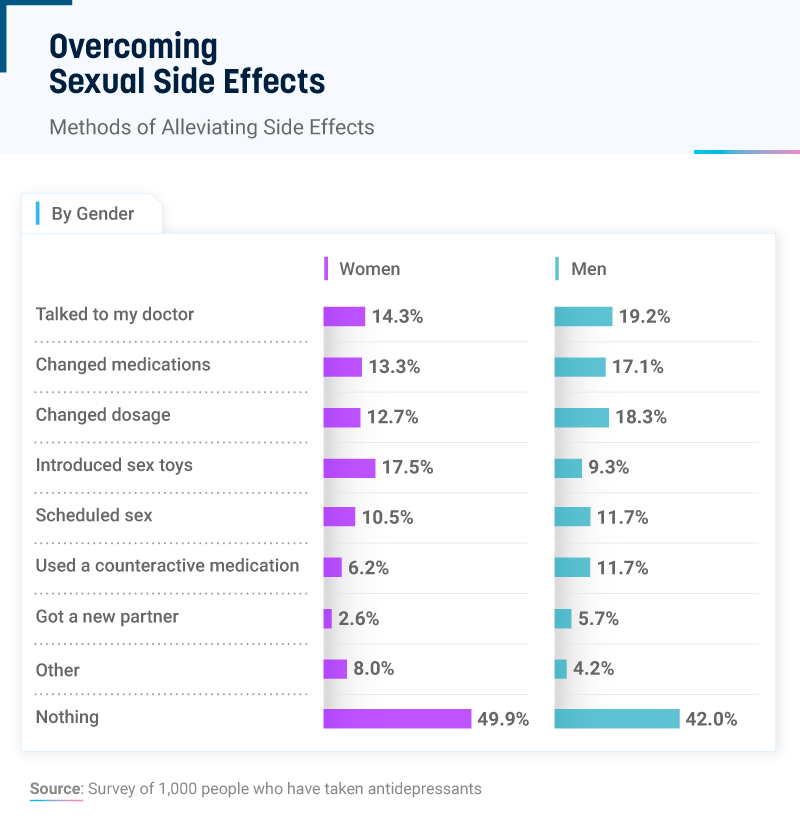If you’re someone who’s been prescribed anti-anxiety medication, you might be wondering, “Can anti-anxiety medication cause sexual side effects?” It’s an important question to ask because sexual well-being is an integral part of our overall health and happiness. Let’s dive into this topic and explore the potential impact of these medications on our sexual lives.
When it comes to managing anxiety, medication can be a helpful tool. However, like many medications, anti-anxiety drugs can come with their own set of side effects. And yes, one of those potential side effects can be changes in sexual function. It’s a topic that isn’t often openly discussed, but it’s important to have a comprehensive understanding of the potential effects that medication can have on our bodies and minds. So, in this article, we’ll explore the connection between anti-anxiety medication and sexual side effects, providing you with the information you need to make informed decisions about your mental health and overall well-being. Let’s get started!
Can Anti-Anxiety Medication Cause Sexual Side Effects?
Anxiety is a common mental health condition that affects millions of people worldwide. It can cause symptoms such as excessive worry, restlessness, and difficulty concentrating. Many individuals with anxiety disorders are prescribed medication to help manage their symptoms. However, one potential downside of anti-anxiety medication is the possibility of experiencing sexual side effects. In this article, we will explore whether anti-anxiety medication can indeed cause sexual side effects and discuss how individuals can manage these potential issues.
The Relationship Between Anti-Anxiety Medication and Sexual Side Effects
Anti-anxiety medications, such as selective serotonin reuptake inhibitors (SSRIs) and benzodiazepines, are commonly prescribed to alleviate anxiety symptoms. While these medications can be highly effective in reducing anxiety, they may also have an impact on sexual function. Some individuals may experience a decrease in sexual desire, difficulty achieving or maintaining an erection (erectile dysfunction), or delayed ejaculation as a result of taking these medications.
It is important to note that not everyone who takes anti-anxiety medication will experience sexual side effects. The occurrence and severity of these side effects can vary from person to person. Additionally, different medications may have different effects on sexual function. Some individuals may find that their sexual side effects resolve over time or with a change in medication, while others may continue to experience them. It is crucial for individuals to discuss any concerns or issues with their healthcare provider to explore potential solutions.
Managing Sexual Side Effects
If you are experiencing sexual side effects as a result of taking anti-anxiety medication, there are several strategies you can try to manage these effects. It is important to remember that every individual is unique, and what works for one person may not work for another. Here are some potential approaches to consider:
1. Openly communicate with your healthcare provider: Discuss your concerns and experiences with your healthcare provider. They may be able to adjust your medication dosage or switch you to a different medication that has a lower risk of sexual side effects.
2. Explore non-pharmaceutical interventions: In addition to medication, there are various non-pharmaceutical interventions that can help manage anxiety, such as therapy, exercise, and relaxation techniques. These interventions may help alleviate anxiety symptoms and potentially reduce the need for medication.
3. Consider adjunctive treatments: In some cases, healthcare providers may recommend adjunctive treatments to address sexual side effects. For example, certain medications or supplements may be prescribed to counteract the sexual side effects of anti-anxiety medication.
4. Seek support: Talking to a therapist or joining a support group can provide emotional support and guidance for coping with sexual side effects. These resources can offer valuable insight and strategies for managing the challenges associated with medication-related sexual side effects.
5. Prioritize overall well-being: Taking care of your overall physical and mental well-being can positively impact your sexual health. Engaging in regular exercise, maintaining a healthy diet, getting enough sleep, and managing stress can all contribute to a healthy sexual function.
It is important to remember that managing sexual side effects is a collaborative effort between the individual and their healthcare provider. Each person’s experience is unique, and finding the right approach may require some trial and error. By openly communicating with your healthcare provider and exploring different strategies, you can work towards finding a solution that works best for you.
Understanding the Potential Causes of Sexual Side Effects
When it comes to anti-anxiety medication and sexual side effects, it is essential to understand the potential causes. The exact mechanisms behind these side effects are not fully understood, but there are several theories:
1. Neurotransmitter imbalance: Anti-anxiety medications, particularly SSRIs, work by altering the balance of neurotransmitters in the brain. This imbalance may affect sexual desire, arousal, and orgasmic function.
2. Hormonal changes: Some medications can impact hormone levels, potentially leading to changes in sexual function. For example, elevated levels of prolactin, a hormone that regulates sexual function, have been observed in individuals taking certain anti-anxiety medications.
3. Psychological factors: Anxiety itself can impact sexual function, and the use of medication may exacerbate or interact with these psychological factors. Stress, worry, and self-consciousness can all contribute to sexual difficulties.
4. Individual variation: Each person’s body chemistry is unique, and individuals may react differently to medications. Some individuals may be more susceptible to sexual side effects, while others may not experience any.
Understanding the potential causes of sexual side effects can help individuals and their healthcare providers develop appropriate strategies for managing these issues. It is crucial to remember that sexual side effects are not inevitable and that there are steps that can be taken to mitigate their impact.
Taking Control of Your Sexual Health
Experiencing sexual side effects can be distressing for individuals taking anti-anxiety medication. However, it is essential to remember that there are options available for managing these effects. By openly communicating with your healthcare provider, exploring different strategies, and prioritizing your overall well-being, you can take control of your sexual health and find a solution that works best for you.
In conclusion, while anti-anxiety medication can potentially cause sexual side effects, not everyone will experience these effects. It is important to discuss any concerns or issues with your healthcare provider to explore potential solutions. By working together, you can find strategies to manage sexual side effects and prioritize your overall well-being. Remember, you are not alone, and there is support available to help you navigate these challenges.
Key Takeaways: Can anti-anxiety medication cause sexual side effects?
- 1. Anti-anxiety medication may have sexual side effects.
- 2. These side effects can include decreased libido and difficulty achieving orgasm.
- 3. It is important to discuss any concerns about sexual side effects with your doctor.
- 4. Switching medications or adjusting the dosage may help alleviate these side effects.
- 5. Open communication with your partner can also be beneficial in managing any sexual side effects.
Frequently Asked Questions
Question 1: What are the common sexual side effects of anti-anxiety medication?
When it comes to anti-anxiety medication, sexual side effects are not uncommon. These side effects can vary from person to person and may include:
– Decreased libido (loss of sexual desire)
– Difficulty achieving or maintaining an erection (erectile dysfunction)
– Delayed or absent orgasm
It is important to note that not everyone who takes anti-anxiety medication will experience these side effects, and the severity can also vary. If you are experiencing any sexual side effects, it is recommended to speak with your healthcare provider for further guidance.
Question 2: Why do some anti-anxiety medications cause sexual side effects?
Anti-anxiety medications, such as selective serotonin reuptake inhibitors (SSRIs), work by increasing the levels of serotonin in the brain. While these medications are effective in treating anxiety, they can also affect other neurotransmitters in the body, including dopamine and norepinephrine, which play a role in sexual function.
These medications can potentially decrease sexual desire, interfere with arousal, and delay or inhibit orgasm. It is believed that the alteration of neurotransmitter levels in the brain contributes to these sexual side effects.
Question 3: Are all anti-anxiety medications associated with sexual side effects?
No, not all anti-anxiety medications are associated with sexual side effects. While SSRIs are commonly known to cause sexual side effects, other classes of medications, such as benzodiazepines, may have a lower risk. However, individual responses to medications can vary, and it is possible for someone to experience sexual side effects with any type of anti-anxiety medication.
If you are concerned about sexual side effects, it is important to discuss your specific medication and symptoms with your healthcare provider. They can provide personalized advice and potentially recommend alternative medications with a lower risk of sexual side effects.
Question 4: Can sexual side effects from anti-anxiety medication be managed?
Yes, sexual side effects from anti-anxiety medication can often be managed. Your healthcare provider may recommend one or more of the following strategies:
– Adjusting the dosage: Sometimes, reducing the dosage of the medication can help alleviate sexual side effects while still maintaining its effectiveness in treating anxiety.
– Trying a different medication: If the sexual side effects are significant and affecting your quality of life, your healthcare provider may consider switching you to a different anti-anxiety medication that has a lower risk of sexual side effects.
– Adding a medication: In some cases, adding a medication specifically targeted at managing sexual side effects, such as bupropion, may be helpful.
It is important to work closely with your healthcare provider to find the best approach for managing sexual side effects while ensuring effective anxiety treatment.
Question 5: Should I stop taking my anti-anxiety medication if I experience sexual side effects?
No, it is not recommended to stop taking your anti-anxiety medication without consulting your healthcare provider, even if you are experiencing sexual side effects. Abruptly discontinuing medication can lead to withdrawal symptoms and a potential worsening of anxiety symptoms.
Instead, it is important to communicate openly with your healthcare provider about any sexual side effects you are experiencing. They can help guide you through potential solutions, such as dosage adjustments or switching to a different medication, to manage the sexual side effects while still effectively treating your anxiety.
Managing Sexual Side-Effects of Antidepressant Medications
Final Summary: Can Anti-Anxiety Medication Cause Sexual Side Effects?
After diving into the topic of whether anti-anxiety medication can cause sexual side effects, we’ve uncovered some intriguing insights. While these medications are incredibly beneficial for managing anxiety symptoms, it appears that they may come with the potential downside of affecting one’s sexual functioning. This can manifest as decreased libido, difficulty achieving orgasm, or even erectile dysfunction.
It’s important to note that not everyone will experience these side effects, and the severity can vary from person to person. However, it is a valid concern for those who rely on anti-anxiety medication to find relief from their anxiety symptoms. If you do find that you’re experiencing sexual side effects, don’t panic. Speak openly with your healthcare provider, as they can explore alternative medications or adjust your dosage to alleviate these unwanted effects.
Remember, finding the right balance between managing your anxiety and maintaining a healthy sex life is crucial. Don’t be afraid to have an honest conversation with your doctor about any concerns or questions you may have. They are there to support you and help you find the best possible solution for your individual needs. So, take charge of your mental and sexual well-being, and together with your healthcare provider, find a treatment plan that works best for you.




